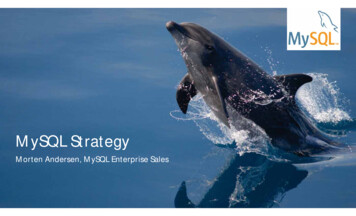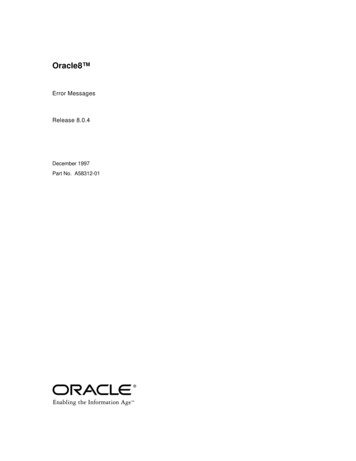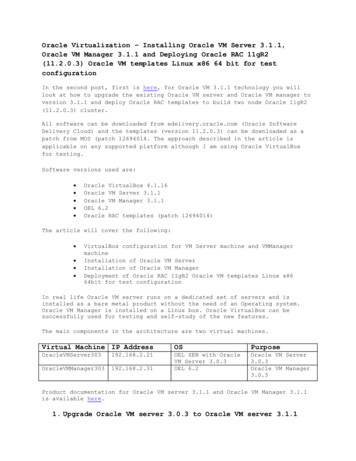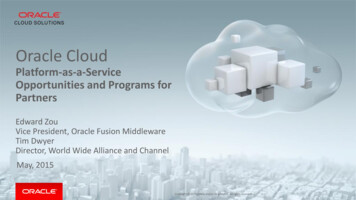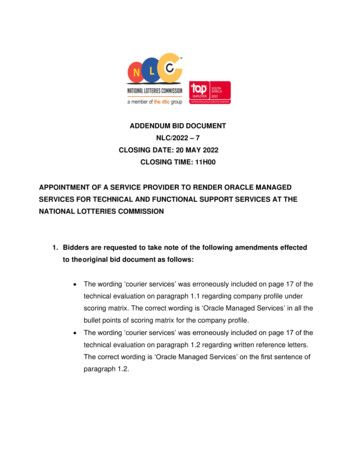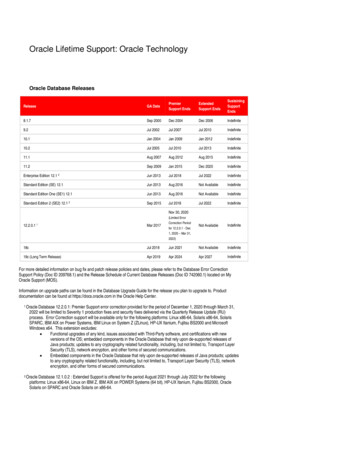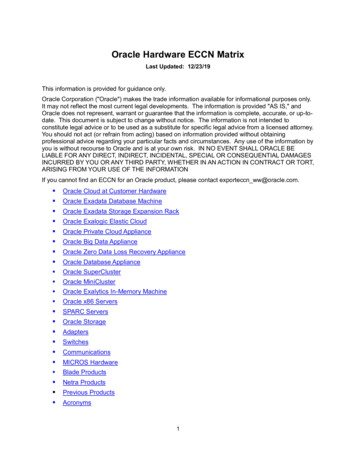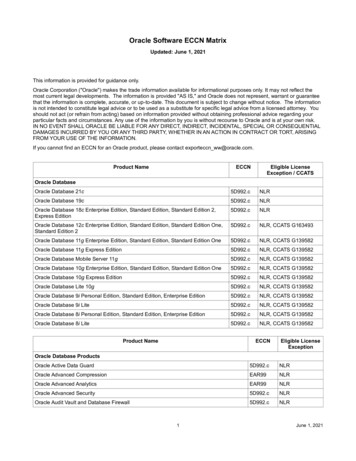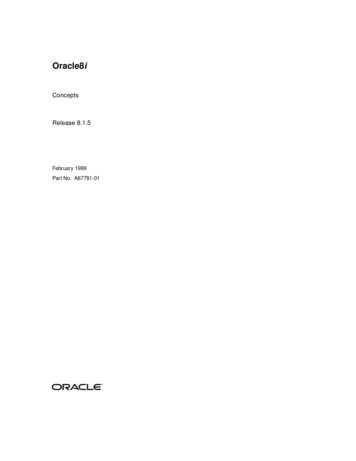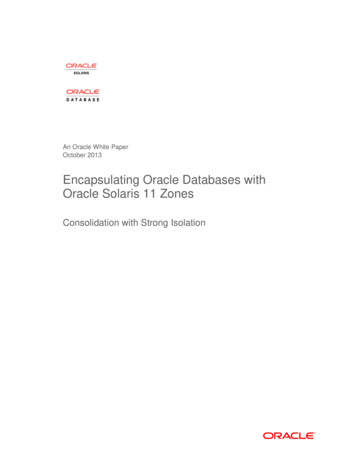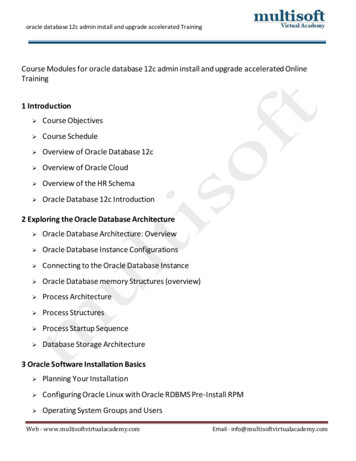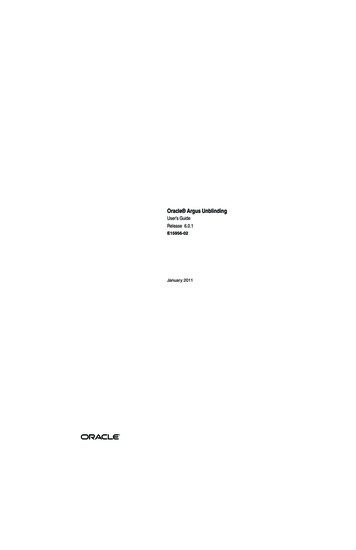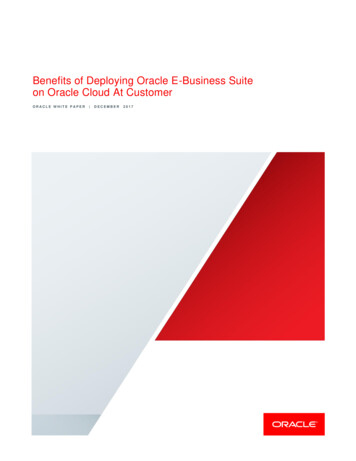
Transcription
Benefits of Deploying Oracle E-Business Suiteon Oracle Cloud At CustomerORACLE WHITE PAPER DECEMBER2017
DisclaimerThe following is intended to outline our general product direction. It is intended for information purposesonly, and may not be incorporated into any contract. It is not a commitment to deliver any material, code,or functionality, and should not be relied upon in making purchasing decisions. The development,release, and timing of any features or functionality described for Oracle’s products remains at the solediscretion of Oracle.BENEFITS OF DEPLOYING ORACLE E-BUSINESS SUITE ON ORACLE CLOUD AT CUSTOMER
Table of ContentsDisclaimer1Executive Overview2Business Value of Deploying E-Business Suite on Oracle Cloud At Customer3Oracle E-Business Suite3Oracle Cloud At Customer3Leveraging Oracle Cloud At Customer for E-Business Suite4Summary8References81 BENEFITS OF DEPLOYING ORACLE E-BUSINESS SUITE ON ORACLE CLOUD AT CUSTOMER
Executive OverviewOracle’s E-Business Suite software is a premier Enterprise Resource Planning (ERP) solution that hasbeen successfully used by many organizations around the world over the past two decades.Traditionally, E-Business Suite (EBS) has been deployed on commodity hardware that was sized basedon initial deployment requirements, with additional hardware being added or upgraded as the scalabilityand performance needs grew over time. This patchwork architecture is unable to take advantage of thecurrent trends in cloud computing, such as Infrastructure as a Service (IaaS) and Platform as a Service(PaaS), which can provide advantages to organizations in areas such as reducing total cost ofownership, becoming more agile and competitive, and meeting requirements of E-Business Suite in theareas of integration, customization, scalability and availabilityThis whitepaper will outline how Oracle Cloud At Customer (OCC) provides benefits for running EBusiness Suite on the following fronts Cloud On Premises – Realize all of the resilience, scalability and functionality of cloud computing withOracle Cloud At Customer, which delivers Oracle Public Cloud capabilities in a customer’s data center.This allows customers to conform to all legal, regulatory, data sovereignty and privacy requirements fortheir E-business Suite and other applications hosted on Oracle Cloud At Customer.Oracle Compute Cloud IaaS – Modern and resilient platform to host E-Business Suite and otherapplications, with seeded orchestrations and cookbooks available for E-Business Suite to automatedeployments and migrate E-Business Suite environments from current hardware to Cloud. It alsoprovides improvements in the lifecycle activities of E-Business Suite such as cloning and backup.Oracle PaaS Services – Utilize Oracle PaaS services available on Oracle Cloud At Customer, whichare identical to the PaaS services available on Oracle Public Cloud to provide out-of-the-box capabilitiesfor E-Business Suite in various facets for customization and personalization (using Java Cloud Service)and integration (using Integration Cloud Service), among many others.Single Platform / Lower TCO – Modernize your hardware, lower your operating costs, increaseavailability and consolidate E-Business Suite and other applications onto a single platform – OracleCloud At Customer. Achieve overall lower total cost of ownership (TCO) – Oracle installs, manages,maintains and supports Oracle Cloud At Customer, enabling customers to focus on IT and running theirbusiness.2 BENEFITS OF DEPLOYING ORACLE E-BUSINESS SUITE ON ORACLE CLOUD AT CUSTOMER
Business Value of Deploying E-Business Suite on Oracle Cloud At CustomerCustomers deploying E-Business Suite on Oracle Cloud At Customer gain benefits in these major areas IaaS Benefits – Oracle Cloud At Customer provides orchestrations and cookbooks for E-Business Suite,which utilize the Oracle Compute Cloud IaaS service and enable quick deployment of E-Business Suiteinstances in as little as a few hours. These orchestrations employ recommended practices from Oracle , andinclude migration of E-Business Suite from on-premises hardware to cloud. In addition, the storage andnetwork capabilities are built in to the IaaS layer and will reduce time taken for lifecycle activities such ascloning, backup, restore and patching. PaaS Benefits – Oracle Cloud At Customer includes the same PaaS services that are available in OracleCloud, such as Java Cloud Service (JCS) and Integration Cloud Service (ICS). JCS is used to deploycustomizations and extensions to E-Business Suite to quickly tailor the application to suit businessrequirements, while ICS implements simplified integration of E-Business Suite with other applications, bothon-premise and in the cloud, using a point-and-click UI with no coding involved. Cloud Benefits - Customers consolidate disparate E-Business Suite instances into an Oracle Cloud AtCustomer configuration that is suitable for them today, to be assured of growth, availability and scalability inthe future. Consolidation can include other Oracle applications, Oracle Fusion Middleware and third-partyapplications. Fewer E-Business Suite and other application instances on a standard platform results in loweradministrative costs. With Oracle maintaining and managing Oracle Cloud At Customer, customer resourcesare better utilized to focus on adding IT and business value.Oracle E-Business SuiteOracle E-Business Suite is the most comprehensive suite of integrated, global business applications available on themarket. It enables organizations to make better decisions, reduce costs and increase customer satisfaction. Some ofthe common challenges faced by customers when implementing E-Business Suite are – Integrating E-Business Suite with other Oracle applications that are on-premises or in the cloud Utilizing a standards-based toolset to personalize, customize and extend E-Business Suite Quickly provisioning, cloning, backing up or restoring E-Business Suite instances Scaling in/out E-Business Suite environments dynamically to meet user demandAs business needs grow and evolve, customers also choose to implement functionality in SaaS applications such asOracle ERP Cloud and Oracle HCM Cloud. These hybrid deployments involving E-Business Suite are becoming morecommon, as they allow customers to uptake the latest capabilities and features that SaaS applications provide. Tosupport business requirements, E-Business Suite must be integrated with these SaaS applications, and also utilizePaaS services in a layered approach to extend current functionality.Oracle Cloud At CustomerOracle Cloud At Customer (OCC) consists of Oracle IaaS and PaaS cloud software, hardware, and a managed serviceoffered on a subscription basis and available in a customer’s data center. It runs the same cloud software as in OracleCloud - all delivered as a service on-premises and offer the same benefits of cloud – agility, simplicity, availability andautomation. OCC allows customers to concentrate on tasks that add value to their business, while Oracle installs,maintains and manages the hardware and IaaS and PaaS services running on the hardware.3 BENEFITS OF DEPLOYING ORACLE E-BUSINESS SUITE ON ORACLE CLOUD AT CUSTOMER
Oracle Cloud At Customer, as shown in Figure 1, includes two components – Oracle Compute Cloud IaaS, whichbundles services such as compute, storage, network and identity services to form the basis upon which virtual serverscan be instantiated and run, and Oracle PaaS services such as Java Cloud Service, Integration Cloud Service andDatabase Cloud Service, which utilize the same technology as Oracle Public Cloud and provide the exact samefunctionality. As more Oracle PaaS services are offered on Oracle Public Cloud in the future, the same PaaS serviceswill also be offered on Oracle Cloud At Customer.Figure 1 – Oracle Cloud At CustomerLeveraging Oracle Cloud At Customer for E-Business SuiteOracle Cloud At Customer is ideally suited when E-Business Suite has to be integrated with a number of applicationswhere low latency is required, or where legal, regulatory, data sovereignty or privacy requirements need to be adheredto, or where application response SLAs are high. Since OCC is located in a data center chosen by the customer, itmeets all compliance requirements for customer applications, including E-Business Suite.Benefits of Oracle Compute Cloud (IaaS)OCC includes Oracle Compute Cloud IaaS service – the same exact service available in Oracle Public Cloud - whichserves as the basis for hosting virtual servers in which Oracle E-Business Suite and other applications can be run.This IaaS service is characterized by – Highly automated and resilient cloud operations through a self-healing and self-organizing control plane Highly scalable through self-install and self-configuration of services in the control plane Self-service workflows for day to day user operations and administrative tasks4 BENEFITS OF DEPLOYING ORACLE E-BUSINESS SUITE ON ORACLE CLOUD AT CUSTOMER
Fully API driven deployment with the same API across both Oracle Public Cloud and OCC Out of the box integration with EMCC to provide single pane of management across ess Suite Orchestrations - Oracle Compute IaaS hosts virtual servers that can run E-Business Suite andother applications. Cookbooks and orchestrations are available to deploy and provision E-Business Suite on OracleCompute IaaS in various topologies, ranging from a simple single-VM Vision Demo instance, to a multi-tier, multi-VMscalable and highly-available architectures. The provisioning and deployment of E-Business Suite instances can becompleted in as little as a few hours. The automation in the deployment process ensures quick, consistent and errorfree experience, and also includes various best practices as recommended by Oracle.Once E-Business Suite VMs are created on Oracle IaaS using the deployment process, the VMs can be customizedand converted to VM templates to suit specific customer requirements. The templates can then be used to provisionother E-Business Suite environments quickly in support of agile development processes. Instructions and cookbooksare also available to scale out/in EBS middle tier virtual machines (VMs) to meet increased/decreased user loads, andto migrate current EBS environments from on-premises traditional hardware to OCC.E-Business Suite Lifecycle Operations - The IaaS layer includes storage snapshot capability, where copies ofbinaries and filesystems can be made instantaneously. This capability can be used to substantially reduce the timetaken for E-Business Suite lifecycle activities such as cloning, backup and recovery. In the E-Business Suite cloningprocess, the majority of the elapsed cloning time is spent in copying the E-Business Suite binaries and database fromthe source instance to the target instance. Storage snapshots can be used to make copies instantaneously, shorteningthe elapsed cloning time to a few hours or less. The E-Business Suite cloning process can be automated as well,allowing for a more robust, consistent, error-free process to execute E-Business Suite clones, either on an on-demandor scheduled basis. The storage snapshot capability can also be used to easily facilitate rollback of an E-BusinessSuite patch, if so desired. A snapshot taken just before a patch is applied to E-Business Suite can be restored quicklyto rollback the effects of a patch. Quick backups of entire E-Business Suite environments, as well as quick restores,are also possible using the IaaS snapshot capability.The IaaS layer provides a consolidation platform for E-Business Suite, as OCC is capable of hosting all of the EBusiness Suite instances required both during the implementation, and production support phases, of a deployment.During both phases, E-Business Suite requires a large number of instances (Dev, Test, QA, Conference Room Pilot,Patch, Sandbox, Pre-prod, Production etc) to support various needs. Consolidation of all these instances onto a singleplatform allows for standardization, reducing maintenance and management costs, and lowered TCO.The IaaS layer is also architected to be resilient and highly-available - it serves as a high performance platform forapplications – all features that are critical to the success of an E-Business Suite deployment.Portability Between Oracle Public Cloud and OCC – Since the IaaS Compute Cloud Service on OCC is identicalto that of Oracle Public Cloud, porting or migrating application instances, including E-Business Suite, between OraclePublic Cloud and OCC, is possible. Test, demo or sandbox instances of E-Business Suite can be deployed on OraclePublic Cloud and then cloned or moved to OCC as needed.Benefits of Oracle PaaS ServicesE-Business Suite is characterized by its ability to suit a multitude of business needs using customization, extensionsand personalization. Java Cloud Service (JCS) includes Oracle Web Logic Server for developing and deployingcustom applications and extensions to E-Business Suite. Specific functionality that is not available in E-Business Suitecan easily be developed and integrated using JCS, which provides the necessary tooling for personalization,customization and extension of various facets of E-Business Suite. An example is building a simplified sales order5 BENEFITS OF DEPLOYING ORACLE E-BUSINESS SUITE ON ORACLE CLOUD AT CUSTOMER
entry portal using JCS and Oracle Application Development Framework (ADF) that is a front end application integratingwith E-Business Suite. Another example is utilizing the E-Business Suite security model to authenticate users to acustom mobile application developed in JCS and ADF for various approvals such as purchase orders, expensereports, vacation requests etc.Integration Cloud Service (ICS) is a secure and intuitive platform to enable mission-critical integrations between EBusiness Suite and other applications, whether on-premises or in the cloud. It simplifies development of integrationsbetween applications without needing to write any code, and includes pre-built integrations between various Oracleand third-party software offerings. ICS can be used in conjunction with Integrated SOA Gateway or REST APIfunctionality built into E-Business Suite to provide EBS integration capabilities without having to write any code. ICSalso includes an E-Business Suite adapter which leverages the functionality of Oracle E-Business Suite IntegratedSOA Gateway (ISG), provides the connectivity between Oracle E-Business Suite and other applications, andsignificantly simplifies the complexity of typical integration experiences.There are several types of integrations that can be achieved with ICS on OCC –Integrate with on-premise applications – E-Business Suite can be integrated with other on-premises applications,whether Oracle or third-party. An example is integrating E-Business Suite with PeopleSoft, where PeopleSoft is thesystem of record for HR data, and ICS integration synchronizes HR data from PeopleSoft to E-Business Suite.Integrate with Oracle SaaS applications - An example is an ICS mapping that can be used to send item details inE-Business Suite to Oracle Configure, Price and Quote (CPQ) cloud, which is mapped to item and quote details toOracle Sales Cloud to generate a sales order, as shown in Figure 2.Figure 2 – Example integration Of E-Business Suite with Oracle SaaS applicationsIntegrate with third-party SaaS applications - An example is E-Business Suite running on OCC integrated withSalesforce. Pre-built adapters and process flows allow EBS to automatically synch opportunity, contact and quotedata, as shown in Figure 3. The opportunity to quote cycle can be easily automated using features in ICS, freeingbusiness users from basic data entry and integration. Salesforce.com application integration requires more than simplyconnecting a few web service calls. You must also consider important issues related to authentication, sessionmanagement and transformation mappings, all of which can easily be achieved using ICS.6 BENEFITS OF DEPLOYING ORACLE E-BUSINESS SUITE ON ORACLE CLOUD AT CUSTOMER
Figure 3 – Example integration of E-Business Suite with Third-party SaaS applicationOther integration patterns that E-Business Suite can be utilized with ICS to support business flows and functionalityare as follows Synchronous Request / Response – In this scenario, an application sends a request to another applicationand waits for a response. Examples are Oracle Sales Cloud application fetching a list of service requests ororders from on-premise E-Business Suite to provide a unified customer view, or requesting a customer creditcheck from E-Business Suite. Asynchronous Request – In this case, an application sends a request to another application but does notwait for or need a response from another application. Examples include Oracle Marketing Cloud sending“Convert Opportunity to Quote” business event to E-Business Suite, or a “New Organization Created” eventin E-Business Suite event that synchronizes data with other applications that maintain a copy of organizationdata. Publish / Subscribe – In this model, applications publish events or subscribe to events that otherapplications publish. Examples are E-Business Suite sending Item Master updates to other applications, orother applications subscribing to an “Employee Terminated” event in E-Business Suite to perform necessaryemployee account deactivations in other applications.7 BENEFITS OF DEPLOYING ORACLE E-BUSINESS SUITE ON ORACLE CLOUD AT CUSTOMER
SummaryThe Oracle Cloud IaaS and PaaS capabilities delivered with Oracle Cloud At Customer provide numerous benefits tocustomers running E-Business Suite. Oracle delivers the identical functionality of the Oracle Public Cloud in customersdata centers by maintaining and managing the hardware and IaaS / PaaS services, allowing customer IT resourcesto execute on value-added activities. The IaaS service allows for accelerated lifecycle activities for E-Business Suite.It supports agile development methodologies like DevOps and provides a scalable, resilient, available and highperformance platform to execute E-Business Suite. The PaaS services simplify customization, integration andextension capabilities for E-Business Suite.Customers continue to push Oracle E-Business Suite to the limit to meet business needs. With Oracle Cloud AtCustomer, there is a new way to deploy with a platform that accelerates application agility to deliver business needswhile easing management and reducing overall costs.ReferencesOracle Cloud At Customer - AnnouncementIntegration Cloud Service - Portal and eBookJava Cloud Service - Portal and eBookDatabase Cloud Service - PortalMOS Doc 129649.1 - FAQ for Integration of Oracle E-Business Suite and Oracle Application DevelopmentFramework (ADF) ApplicationsIntegration Scenarios for E-Business Suite - Oracle Fusion Middleware for E-Business Suite8 BENEFITS OF DEPLOYING ORACLE E-BUSINESS SUITE ON ORACLE CLOUD AT CUSTOMER
Oracle Corporation, World HeadquartersWorldwide Inquiries500 Oracle ParkwayPhone: 1.650.506.7000Redwood Shores, CA 94065, USAFax: 1.650.506.7200CONNECT W ITH r.com/oracleoracle.comCopyright 2017, Oracle and/or its affiliates. All rights reserved. This document is provided for information purposes only, and thecontents hereof are subject to change without notice. This document is not warranted to be error-free, nor subject to any otherwarranties or conditions, whether expressed orally or implied in law, including implied warranties and conditions of merchantability orfitness for a particular purpose. We specifically disclaim any liability with respect to this document, and no contractual obligations areformed either directly or indirectly by this document. This document may not be reproduced or transmitted in any form or by any means,electronic or mechanical, for any purpose, without our prior written permission.Oracle and Java are registered trademarks of Oracle and/or its affiliates. Other names may be trademarks of their respective owners.Intel and Intel Xeon are trademarks or registered trademarks of Intel Corporation. All SPARC trademarks are used under license andare trademarks or registered trademarks of SPARC International, Inc. AMD, Opteron, the AMD logo, and the AMD Opteron logo aretrademarks or registered trademarks of Advanced Micro Devices. UNIX is a registered trademark of The Open Group. 1217Benefits of Deploying Oracle E-Business Suite on Oracle Cloud At CustomerDecember 2017
This whitepaper will outline how Oracle Cloud At Customer (OCC) provides benefits for running E-Business Suite on the following fronts - Cloud On Premises - Realize all of the resilience, scalability and functionality of cloud computing with Oracle Cloud At Customer, which delivers Oracle Public Cloud capabilities in a customer's data center.
